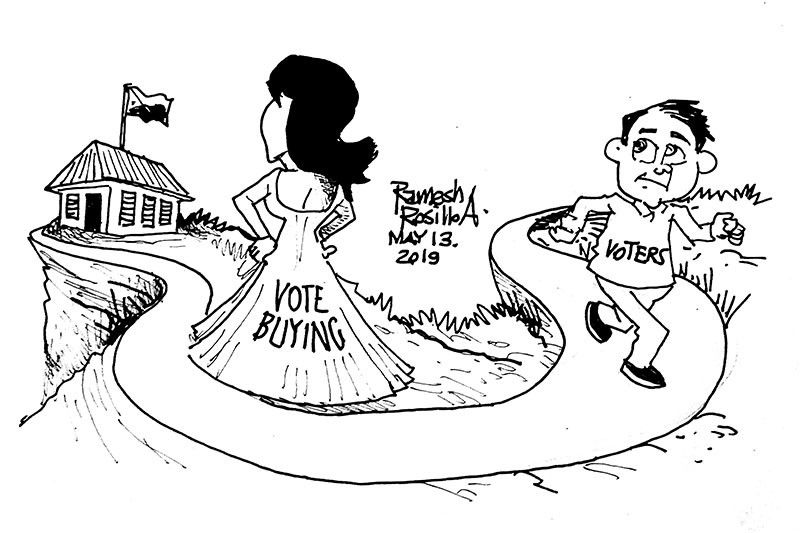Cartoon courtesy of www.philstar.com.
In a startling revelation, Sri Lanka’s businessman Dhammika Perera, who aspires to enter the presidential race, has made a striking statement that should raise alarm bells. According to a recent article by K. Sujeewa in “Anidda” newspaper, published on Sunday, October 29, Perera is willing to pay a significant price for votes, boldly stating, “If SLPP vote base ‘Pohottuwa’ rises to 30%, the remaining 20% will be bought over in cash.” This admission sheds light on a disturbing trend in the country’s politics and the potentially dangerous implications for democracy.
Business Tycoons Eyeing the Presidential Arena
Dhammika Perera is not alone in his quest for political power. Another prominent businessman, Dilith Jayaweera, is reportedly gearing up to join the presidential race. However, their affiliations and motives must be scrutinized. Both Perera and Jayaweera are widely seen as loyalists of the Rajapaksa clan, indicating an ongoing attempt by the Rajapaksas to consolidate their power base through unconventional means.
These business tycoons have amassed significant wealth, particularly since the Rajapaksas’ rise to power in 2005. As confirmed by the Auditor General, out of the 8 trillion project loans Sri Lanka received by 2015, only 2 trillion worth of assets can be accounted for. This alarming gap begs the question: what happened to the remaining 6 trillion, and how might it be connected to business figures?
Entry of Perera and Jayaweera
Dhammika Perera found his way into Sri Lanka’s Parliament, albeit through unconventional means, using a legislative loophole. Dhammika Perera and Dilith Jayaweera’s role in previous elections and their financial investments in political campaigns cannot be ignored. The question arises: how much did these businessmen contribute to bringing political leaders like Gotabaya Rajapaksa to power?
Business Interests and Political Favours
The Rajapaksas have shown gratitude to businessmen like Dhammika Perera and Dilith Jayaweera by granting them various favours. For instance, Perera was allowed to run a casino business without impediments, and the recent discussion of a casino tax scandal raises concerns about their influence in government circles. Furthermore, Jayaweera’s pharmaceutical company was granted a lucrative monopoly during the COVID-19 pandemic to import antigen test kits, demonstrating the intertwining of business interests and political decisions.
The Call for Accountability
This collusion between businessmen and politicians raises questions about the integrity of Sri Lankan politics. It is imperative that these individuals are held accountable for their actions and that any ill-gotten assets are returned to the public. The need for transparency and justice is paramount.
The Commoditization of Votes
The blatant statement made by Dhammika Perera that he is willing to “buy 20% of the vote in cash” is not only a violation of the Election Law if an election had been declared but also a grave affront to the democratic process. Such remarks reduce the value of the vote to a mere commodity, casting doubt on the integrity of the election system and the politicians involved.
The Transformation of Sri Lankan Politics
The evolution of Sri Lankan politics is evident when comparing politicians from the post-independence era to those who emerged after the 1970s. The latter have relied heavily on financial backing from businessmen to fund their election campaigns. The consequences are far-reaching, as these politicians prioritize personal gain over the welfare of the nation.
Many individuals with questionable backgrounds and vested interests have found their way into Parliament, including those accused of murder and illicit activities. The intertwining of business interests and political power is a concerning trend that needs to be addressed, as it undermines the principles of democracy.
The Decision for Sri Lankan Voters
Sri Lankan voters now face a critical choice: whether to sell their votes to individuals like Dhammika Perera, who see their ballots as commodities or to reject the influence of corrupt businessmen and politicians who have profited at the expense of the nation.
The author is a former Senior Consultant, Sri Lanka Institute of Development Administration (SLIDA). He can be contacted at [email protected]
1 November 2023 /This article was first published in The Daily Mirror
